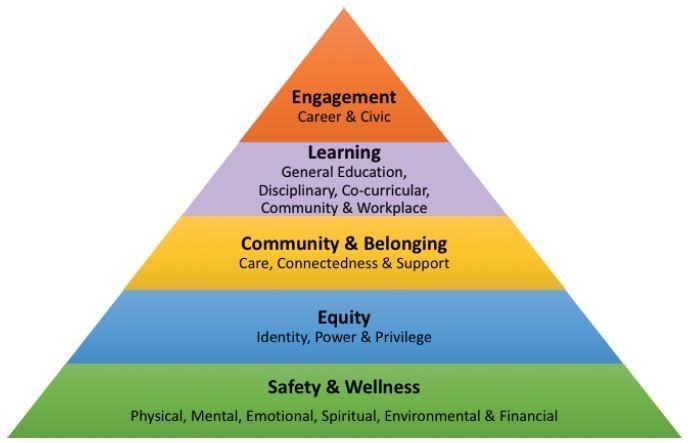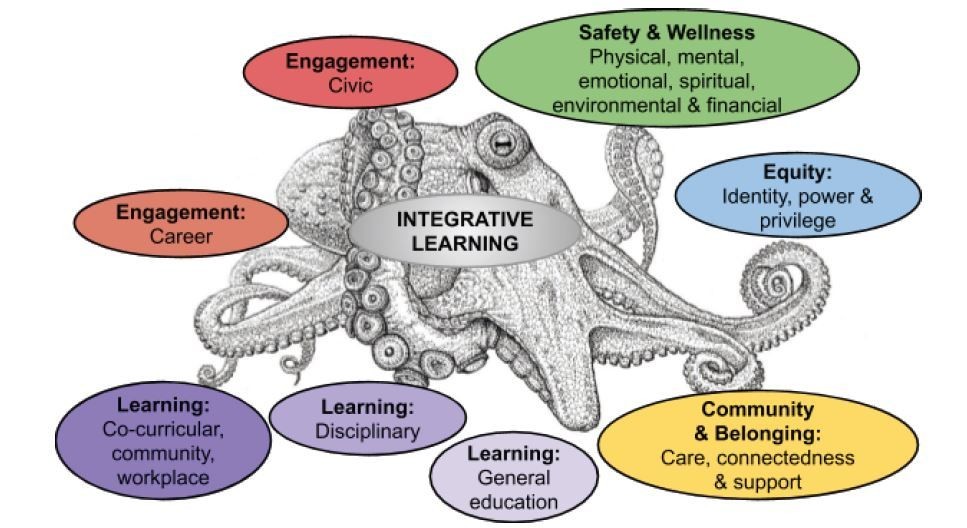Holistic wellness & integrative learning
CSUMB educators* help students engage in their career development and civic lives by fostering holistic wellness and integrative learning
*CSUMB educators include faculty, student affairs professionals, staff, students, and community partners
The holistic wellness and integrative learning paradigm was developed by a cross-divisional team of CSUMB faculty, student affairs professionals, and administrators who participated in the 2017 AAC&U Institute on Integrative Learning and Signature Work. The paradigm is grounded in the belief that for a university and its surrounding communities to thrive, everyone needs to understand the connections among WELLNESS ( physical, mental, emotional, spiritual, environmental, and financial); EQUITY (identity, power, and privilege); COMMUNITY & BELONGING (connectedness and support); LEARNING (general education, disciplinary, co-curricular/community, and workplace); and ENGAGEMENT (career and civic). The more an institution can help its staff, faculty, and students foster and integrate those dimensions, the more an institution and its community partners will thrive. (This framework utilizes UC Davis' Eight Dimensions of Wellness.)
Fostering this paradigm requires CSUMB educators --which include faculty (lecturers and tenure-line), co-curricular professionals in Academic Affairs and Student Affairs, other university employees, students, and community partners -- to model and foster integrative learning that helps them and the students they work with promote and connect all dimensions of the paradigm within and across curricular, co-curricular, and community contexts.
CSUMB's Health and Wellness Services has many programs that support holistic wellness
Holistic wellness and integrative learning paradigm
We thrive as a community when we all help each other integrate learning that fosters wellness, equity, belonging, career development, and civic engagement.

Safety
Being our authentic selves without heightened risk of physical or emotional harm
Physical Wellness
Meeting needs for physical activity, diet, sleep, and nutrition
Mental & Emotional Wellness
Responding productively to life situations and creating satisfying relationships
Spiritual Wellness
Expanding our sense of purpose and meaning in life
Environmental Wellness
Fostering pleasant, stimulating environments that support good health and well-being
Financial Wellness
Establishing satisfying current and future financial situations
Equity
Recognizing, discussing openly, and responding productively to influences of identity, power, and privilege
Community & Belonging
Developing a sense of connection and a well-developed support system of caring family, friends, and/or colleagues
Learning
Recognizing creative abilities and finding ways to expand knowledge and skills in personal, curricular, co-curricular, community, and workplace contexts
Engagement
Achieving satisfaction and enrichment derived from one's professional and civic work and its impacts on others
Octopus version
WSCUC Academic Resources Conference Presentation
WSCUC ARC 2018: Fostering Institutional Change to Support Holistic Wellness, Learning, and Engagement presentation abstract and PowerPoint
